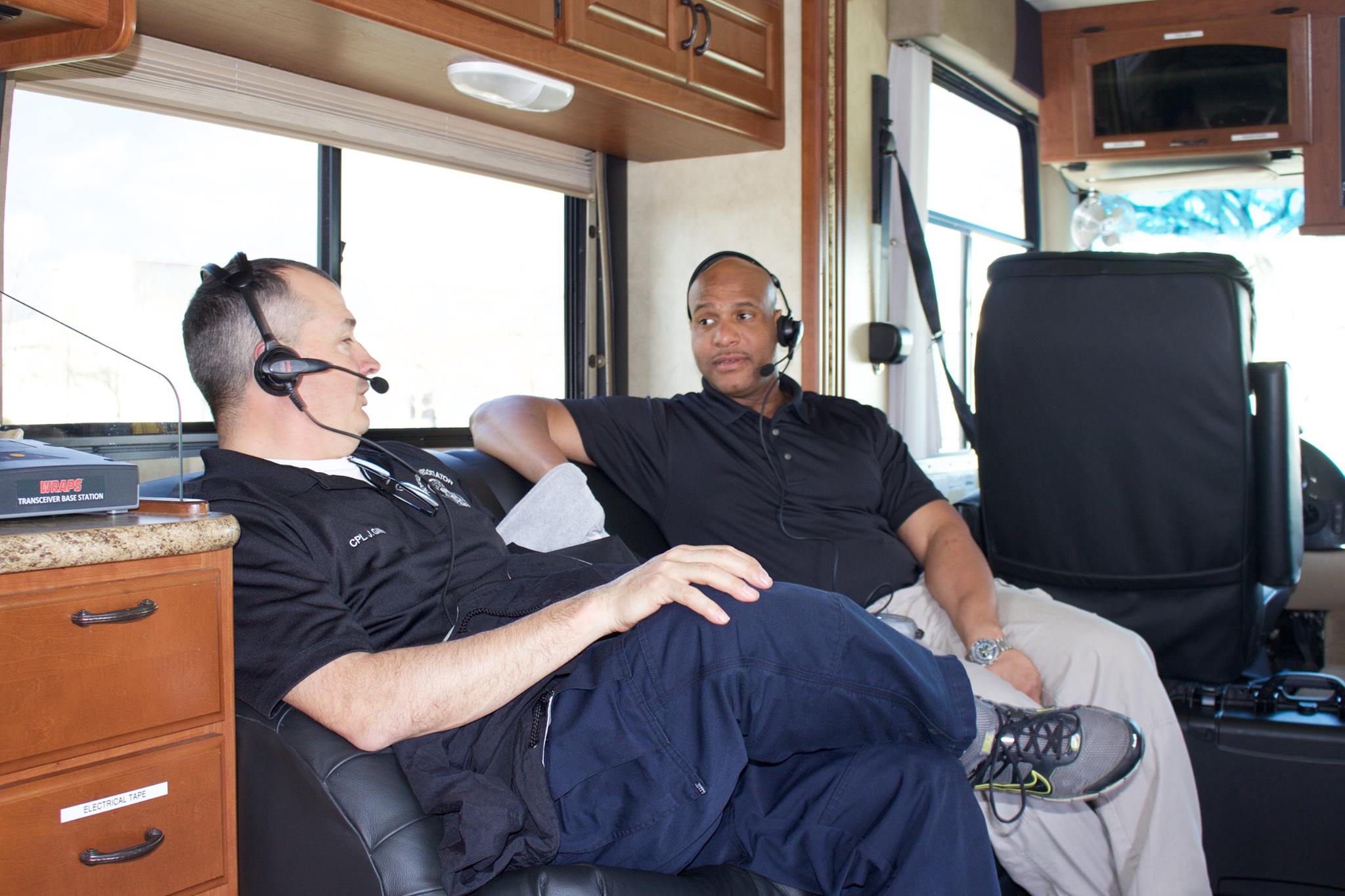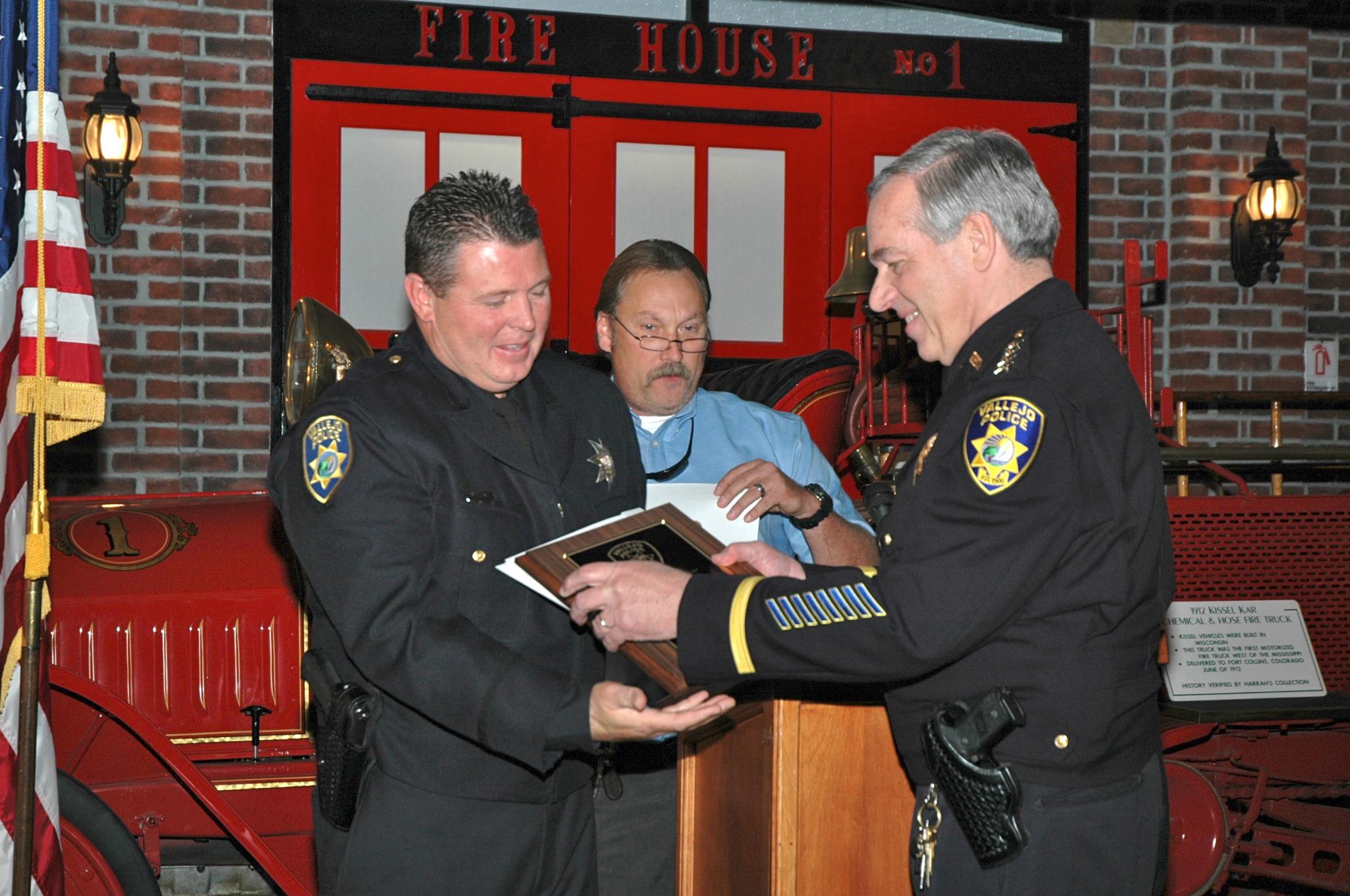VALLEJO – An investigation into allegations of racism by Vallejo police Sgt. Mat Mustard could jeopardize dozens of criminal prosecutions as outside investigators determined that three Vallejo detectives, including Mustard, provided accounts that were not credible.
The leaked investigation into Mustard was completed last year. First reported by KQED in October and independently obtained by the Vallejo Sun, the investigative report corroborated that Mustard referred to a racist joke and that he addressed a Black subordinate detective as “boy” on multiple occasions. But investigators from outside the department concluded that Mustard did not have racist intent when he did and said those things.
The investigation, however, also found Mustard’s defense of the joke was contradicted by other evidence and determined his explanation was not credible. It found that two other detectives — Terry Schillinger and Scott Yates — also gave accounts that were not credible during the course of the investigation, including when Yates called investigators back to change his account of Mustard’s joke.
Support independent journalism
We are a small independent investigative journalism outlet and rely on support from readers. Can you chip in with a one time contribution to help us continue?
Yes, I'll support local news“This investigation did not find Sgt. Mustard’s account as to these issues credible,” the report states. “Specifically, Sgt. Mustard’s account was outweighed by the multiple consistent countervailing witness accounts and other relevant evidence.”
The records obtained by the Sun do not disclose what discipline, if any, the police department imposed on Mustard or the other detectives. The city did not respond to questions about whether any officers were disciplined. But notes written by then-interim Assistant Police Chief Joseph Allio in August 2020 show he appears to have dismissed the investigators’ assessments of credibility.
The report used multiple factors to determine credibility, including motive, and took into account that Mustard had a motive to lie because he faced discipline. In his notes, Allio wrote that the suggestion was “offensive and shows clear bias on the part of the investigator.”
California law dictates that if a police officer is disciplined for dishonesty then the investigative report would be a public record. In response to a public records request, Vallejo records officials said there are no disclosable records against any party involved in the investigation into Mustard’s alleged racist comments.
The contrast between the report’s findings and the apparent inaction by the department raises questions about the department’s willingness to act on the findings of an outside investigation. Another outside investigation recently found that a captain and three detectives violated department policy before and during the shooting of Sean Monterrosa last year.
Despite releasing the findings in the Monterrosa shooting, the city continues to hide the identities of the involved officers. And while the city has disclosed that it intends to fire the officer who shot Monterrosa, Det. Jarrett Tonn, the investigation found three other officers violated department policies leading up to the shooting. The Vallejo Police Officers Association obtained a court order to prevent the city from disclosing Tonn’s name, but the court action does not prevent the city from naming the other officers.
The Monterrosa investigation was finished in June, a year after he was killed, but the department did not move to fire Tonn until this month. Meanwhile, Capt. Lee Horton and Detective Bretton Wagoner, who each were found to have violated policies for failing to de-escalate and unsatisfactory work performance, both left the department. Detective Wesley Pittman was given a written reprimand on Dec. 8.
The investigation into Mustard is the latest scandal involving the detective who investigated the infamous kidnapping of Denise Huskins and falsely accused her then-boyfriend Aaron Quinn of murdering her. Following that incident, which led to a $2 million civil settlement with Huskins and Quinn, Mustard was named officer of the year.
While the investigation into Mustard is not subject to public records law, it is subject to disclosure to defense attorneys to assist in their cases. The findings that three detectives who have handled numerous criminal investigations lacked credibility could be used to impugn their testimony in court. The Solano County District Attorney’s Office did not respond to questions about the extent that the investigators’ findings are affecting prosecutions.
The report also provides a window into the culture of the investigations division under Mustard, the Vallejo Police Officers Association president for most of the last decade.
Schillinger said he would not speak to another detective and refused to brief him on a case prior to a meeting with the lieutenant. The investigators found evidence that Mustard himself directed Schillinger not to work the case. Some employees reported Mustard to be dismissive and unresponsive, replying with one-word answers or not answering emails or text messages.
In one case, Mustard sternly told a detective he couldn’t eat until after he had finished a task.
Yates, one of the detectives found to be not credible, retired in November, according to a post by the Vallejo Police Officers’ Association.
As of this month, Mustard and Schillinger remained employed by the department.
Complaint that Mat Mustard was stern and dismissive
The investigation into Mustard was triggered by a complaint of racist behavior brought by Corporal Jason Scott, a Black detective who worked under Mustard. To conduct the investigation, the city hired Ellis and Makus LLP, a Sacramento-based law firm that specializes in private employee investigations. The final report is dated April 17, 2020.
Mustard has worked at the Vallejo Police Department since 2001. He’s been a detective in the department since at least 2008 and has been involved in several high-profile controversies during that time, including for falsely accusing suspects of crimes they did not commit.
In 2012, Mustard pressured a forensic pathologist in hopes to change her conclusions of an autopsy of a woman found dead in a hotel room to reflect a homicide, despite the absence of injuries that would show that.
“What will it take for you to call this a homicide?” Mustard allegedly asked the pathologist.
In 2015, Aaron Quinn called Vallejo police to report his girlfriend, Denise Huskins, had been kidnapped in the middle of the night. Mustard interrogated Quinn for hours, insisting he’d murdered Huskins. Meanwhile, Huskins was held hostage and allegedly sexually assaulted by Matthew Muller, a former U.S. Marine. When Huskins was released days later, Vallejo police called a press conference to announce the “Gone Girl” case was a hoax.
Muller was later arrested in connection with a different home invasion. An FBI investigation connected him to Huskins’ kidnapping; he was convicted and sentenced to 40 years in federal prison.
Despite the mishaps, Mustard has enjoyed considerable power and influence in the Vallejo Police Department. He was Vallejo’s Officer of the Year the year that Huskins was kidnapped.
In 2018, Mustard was promoted to sergeant and made a supervisor in the investigations division.
Scott joined the Vallejo Police Department in 2006 and was promoted to detective corporal in 2015. He investigated sexual abuse and other crimes against minors, supervised volunteers who processed sex offender registrations and oversaw police cadets. He would also investigate homicides if they occurred on his watch.
Scott filed a complaint alleging Mustard treated him poorly because of his race shortly after Mustard was promoted. Scott reported to Mustard and found him to be rude and dismissive. He believed Mustard unfairly scrutinized his work, investigators wrote in their report.
Scott alleged that Mustard also made racial remarks directed at him, including sternly calling him “boy” twice. Meanwhile, other detectives close to Mustard characterized Scott as lazy. The outside investigation would later find the allegations that Mustard unfairly scrutinized Scott’s work were unsupported. In instances when Scott said that he was being unfairly scrutinized, the investigators found that Mustard was working under direction of a superior or had good reason to review Scott’s work. And while the investigators did corroborate that Mustard called Scott “boy,” they found he didn’t do so with racist intent.

The investigation corroborated one incident when Mustard treated Scott sternly. One night in October 2019, Mustard asked Scott to pick up pizza for the other detectives, who were working late. Scott had been working on a warrant and the FBI had called with relevant information. But according to Scott, he realized he could complete the warrant without the FBI’s additional information and communicated this to Mustard.
Yet when he was out picking up the pizzas, Mustard sent him a text message asking if he’d contacted the FBI. Scott said that after he returned and put the pizzas in the conference room, Mustard confronted him. Scott said that as he was about to go back to his desk to complete the warrant, he reached for a slice of pizza. Mustard slammed the lid of the box down and said, “You are going to do what I told you to do. When you are done, you can have what [pizza] is left,” according to Scott.
Mustard denied that he was aggressive or berated Scott and told investigators he did not believe there was any miscommunication about his expectations for contacting the FBI. But investigators found that other detectives corroborated Scott’s account and wrote, “Sgt. Mustard denied that he engaged in the conduct, but the evidence did not support his account.”
Mustard’s alleged racial remarks
Scott also believed Mustard to be racist following incidents when Mustard called him “boy” twice and referenced a racist joke.
The first time Scott said Mustard called him “boy” was during a lunch break when Scott was in the conference room. According to the investigation, Mustard told him, “You better take care of it, boy,” in a firm and direct tone. Scott complained that Mustard said it a second time, on Oct. 29, 2019, when Mustard approached Scott and asked whether he had completed a task for a homicide investigation. Scott responded he hadn’t and Mustard said, “You better get on it, boy,” according to the report.
The investigators determined it was reasonable for Scott to take offense to being called “boy,” given the history of the term being used in a racially derogatory manner and that Mustard was white and speaking to a Black subordinate. But they found that Mustard did not intend to be racist.
Mustard told investigators that he did not recall calling Scott “boy” but that he sometimes refers to other people that way, such as a cadet or his son. But the investigators also noted that both of these people were young and not a corporal in the department with 13 years of experience. Yates told the investigators that Mustard had at times called him “boy” as well.
A day after the second time Mustard called Scott “boy,” Mustard made a remark that during recent power outages in the city of Dixon, the town was left “as dark as Coley’s ass.” The investigators noted that “dark as Coley’s ass” was a widely-known comment about a Black person and could be spelled “Coaly” or “Coaley,” a slur for a Black person who delivers coal, especially in the South. According to Scott, Mustard looked straight at him when he said it.
According to Scott’s account to investigators, after Mustard told the joke, he explained that his grandfather lived in a town where there was one Black man named Coley. He said if anyone in the town referred to darkness, they said it was as “dark as Coley’s ass.”
Scott’s account was corroborated by another person present, Det. Craig Long. Long, who is Black, told investigators that he had been talking to Scott and recalled a racist joke his great-grandfather told. He said he felt comfortable telling Scott the joke because they were both Black. Mustard joined in the conversation and made the remark about Coley. Long corroborated that Mustard said that Coley was the only Black man in his grandfather’s neighborhood.
When interviewed by investigators, Mustard admitted he made the remark, but said that Coley was the name of his grandfather’s black dog.
Yates initially told investigators that Mustard had said Coley was a Black person, but later called back investigators and left a voicemail to say that Mustard said Coley was his grandfather’s black dog.
The investigators concluded that Mustard had made a racist joke and did not find Mustard’s or Yates’ explanation about the dog credible.
Interactions between other detectives
While the investigators did not find Mustard’s actions were racially motivated, it did reveal significant resentment towards Scott within the investigations division, particularly from Schillinger and Yates. In fact, the report says that Schillinger no longer spoke to Scott because he believed Scott filed a fabricated complaint against him that required him to divulge personal information. The report does not reveal the nature of that complaint.
Both Schillinger and Yates told investigators that Scott was “lazy.” Schillinger said that he believed Mustard should have disciplined Scott long before the incident with the pizza. Yates said he did not like working with Scott because he thought Scott was lazy, citing an instance when Scott arrived at a homicide scene 40 minutes after Yates. According to Yates, by then he had already interviewed all the witnesses and was preparing to leave.

Scott also alleged that Mustard directed Schillinger not to assist him with a murder investigation. He said that when he was out of town for a conference, Schillinger worked on the case and prepared a search warrant. When Scott returned, he asked Schillinger to brief him on the case but Schillinger refused.
Yates told investigators that he overheard Mustard say to Schillinger something like, “Stop working the case for him.”
Schillinger denied the allegation. He said he helped Scott conduct all of the interviews while Scott was out of town and that when Scott returned, he should have read the reports for an update. Schillinger said he wouldn’t provide a verbal update because they were both going to be present in a case briefing with Lt. Fabio Rodriguez and Scott could just get the information there.
But another detective, Sgt. Rob Greenberg, told investigators that Schillinger told him he would lie about Scott’s allegations against Mustard if asked. Greenberg said that he and Schillinger regularly met for coffee in Starbucks, and during one of those meetings, Schillinger said that Mustard told him not to help with an investigation. He said he’d answer untruthfully if anyone questioned him about Mustard’s conduct toward Scott.
Mustard denied that he directed Schillinger not to help Scott on the homicide investigation or work the case for him. “Sgt. Mustard stated that he would not have done so because it would have reflected negatively on the entire Investigations Division if Det. Schillinger failed to work collaboratively with Cpl. Scott,” the report states.
The investigators found that Mustard didn’t direct Schillinger not to help Scott but did find that Mustard told Schillinger “not to work the case for” Scott. The investigators found Schillinger and Mustard’s account was not credible, based in part on Greenberg’s responses.
In his notes, Allio questioned the determination that Greenberg was credible. “Greenberg’s credibility would be in question as he and Scott clearly have a close work history and are friendly enough that Scott calls him shortly after Mustard’s questionable actions,” he wrote. “The report also does not take into account Greenberg and Mustards relationship.” Allio did not elaborate on the nature of that relationship.
In November, Scott was tentatively transferred to the patrol division, a move he wasn’t happy with. Days later, on Nov. 4, 2019, he submitted his complaint accusing Mustard of racism. Rather than have the department’s internal affairs division conduct the investigation, the city tapped Ellis & Makus, a firm it contracted with to conduct investigations into possible employee misconduct. The investigation began on Jan. 13, 2020.
But the decision on whether to impose discipline, or if any issues involved required further investigation, would still be left up to the police department.
Neither the city nor the police department responded to questions about any action they took in response to the report. Scott left the department in September to be an investigator in the Solano County District Attorney's Office.
Before you go...
It’s expensive to produce the kind of high-quality journalism we do at the Vallejo Sun. And we rely on reader support so we can keep publishing.
If you enjoy our regular beat reporting, in-depth investigations, and deep-dive podcast episodes, chip in so we can keep doing this work and bringing you the journalism you rely on.
Click here to become a sustaining member of our newsroom.
THE VALLEJO SUN NEWSLETTER
Investigative reporting, regular updates, events and more
- policing
- Vallejo Police Department
- Vallejo Police Officers Association
- Vallejo
- Mat Mustard
- Terry Schillinger
- Scott Yates
- Jason Scott
- Aaron Quinn
- Denise Huskins
- Ellis and Makus
- Craig Long
- Rob Greenberg
- Joe Allio

Scott Morris
Scott Morris is a journalist based in Oakland who covers policing, protest, civil rights and far-right extremism. His work has been published in ProPublica, the Appeal and Oaklandside.
follow me :




